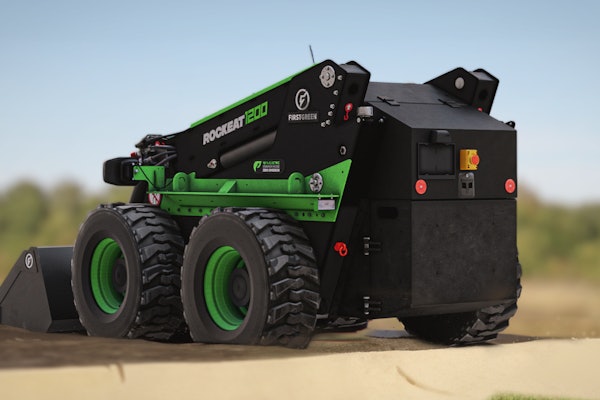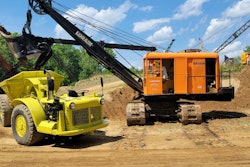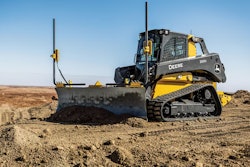
This year the company invited us to observe how the big auction works. If nothing else, the sheer spectacle, size and scale of the event, and the military precision with which it all rolls forward, is a show that’s hard to beat.
The mobile equipment, dozers, artics, excavators and the like queue up in long lines and roll past the reviewing stand, with no one piece pausing more than 30 seconds in front of the bidders.
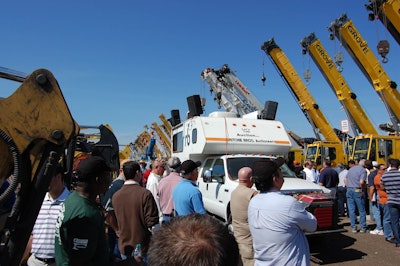 A mobile truck conducts auctions on the yard for equipment that’s too big to run by the reviewing stands.
A mobile truck conducts auctions on the yard for equipment that’s too big to run by the reviewing stands.The first piece of equipment I watched, a big, low-hours Cat D11 in close to mint condition, rolled up and for a few seconds seemed to catch no bids. The caller dropped the asking price to $50,000, which got more than a few people’s attention and the bids quickly vaulted to the six-figure range. Moments like these keep everybody on their toes.
Ritchie Bros.’ auctions are unreserved, meaning there is no guarantee of a minimum price for the seller. Sellers who have never been to an unreserved auction are sometimes hesitant about entering one, says company president Rob Mackay. But with thousands of bidders (8,300 for this latest event) bids don’t stay low for long and typically reach to within a few percentage points (plus or minus) of market value. The beauty of an unreserved auction, Mackay says, is that at the end of the week there isn’t a single item on the lot left unsold.
A good example of the kind of buyer that keeps upward pressure on the bids is John Stancil, vice president of sales for the north Florida Cat dealer Ring Power. Stancil comes to the auction with a list of equipment he wants. But he’s bargain hunting too. The day he talked to us he bought, unplanned, a motor grader and excavator “just because they were a good deal.”
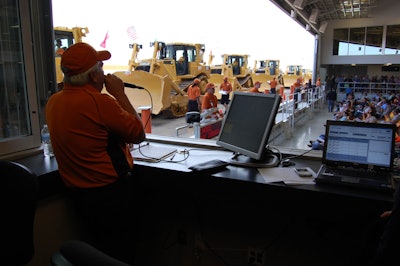 With simultaneous online bidding, the callers have to watch both the audience and their computer screens.
With simultaneous online bidding, the callers have to watch both the audience and their computer screens.The biggest change from the old way of doing business is the presence of the simultaneous online bidders. Big screens are posted in front of the viewing areas that display the latest bid, whether that bidder is in the audience or online half a world away. This year, simultaneous online sales for the event brought in a record $53 million, 31 percent of the total gross proceeds. And online bidders were the winner or runner-up on 51 percent of the lots available online.
That makes the auctioneer’s job a challenge as he has to watch both his spotters in the audience and the computer screen in his auction booth, says Butch Graham, a 27-year veteran auction caller for Ritchie Bros. Calling auctions for high-dollar items like heavy equipment is different from any other type of auctioneering, Graham says.
“You have to have talent, that’s true in any type of auction. But the second most important thing is you have to know the product,” he says. “I can usually figure to within 5 to 6 percent of what a piece of equipment will bring.”
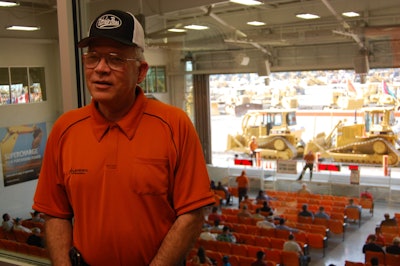 Butch Graham is Ritchie Bros. senior veteran auctioneer and has held auctions for the company and once sold a $12.5 million drilling rig in a minute and a half.
Butch Graham is Ritchie Bros. senior veteran auctioneer and has held auctions for the company and once sold a $12.5 million drilling rig in a minute and a half.A lot of the talent aspect of calling auctions is training one’s voice, Graham says. “You’re like a singer or an athlete. Your voice is like your body. You have to exercise it.” Calling these auctions requires enormous concentration, and the callers typically work in shifts of 45 minutes to an hour before turning the microphone over to another.
In his heyday, Graham conducted up to 70 auctions; now 50 or 60. He is fluent enough in Spanish to conduct auctions in countries that speak that language and has opened up auctions for Ritchie Bros. all over the world. The oddest auction he ever called was in Holland, where to his surprise, he learned that their custom was for everybody to start with their hands up and then drop their hands when the bidding gets too high for their tastes. Dubai was the toughest auction he ever called, where the bidders wanted to haggle the price down after they’d won the bid.
Perhaps the most intriguing aspect to the auction is the last day. Here, Ritchie Bros. auctions off trucks, heavy and light duty, and what Bob Armstrong, chief strategic development officer calls “contractor toys.” These can be any tangible, transportable asset from sports cars, to boats, planes, 4-wheelers, ATVs and even helicopters. Armstrong explains that the company doesn’t solicit or encourage contractors to offer such items, but if a big customer asks, they’ll usually oblige. And it makes for a fascinating last day for those who are curious enough to stick around until the end of the week.
The company has 115 more auctions coming this year. You can find out more at www.rbauction.com.







